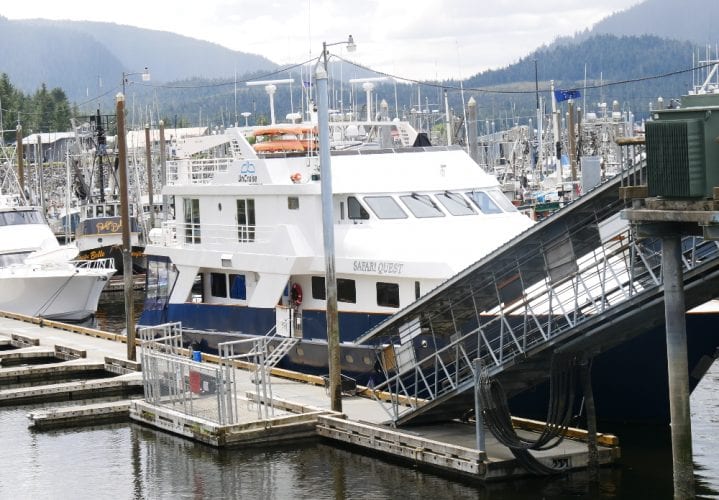
Complaints about cruise ships discharging wastewater have reached Petersburg’s borough assembly. Elected officials say they’re looking into the issue.
Petersburg fisherman Ladd Norheim had his salmon tender boat tied up to the South Harbor earlier this month. He walked by a small cruise ship tied up in that same harbor and says something didn’t smell right.
“It’s solid brown fecal matter, that’s a good word, huh?,” Norheim said. “It is solid, swear to god. It was about a foot long, I don’t know how deep and it was under the oil sheen, moving back to the south.
The vessel was the Safari Quest, a boutique cruise ship operated by UnCruise.
“And I started walking, between the dock and I went clean to mid-ship on that hundred and some foot boat and it just got solid between the dock,” Norheim said. “It was just solid. There was no water. There was no oil sheen. There was just brown. I’ve seen it before. And I know what it was. And then I walked up about mid-ship and there it was, just boiling, boiling out.”
Norheim reported the July 12 incident to harbor staff who ended up talking to the ship’s captain about the discharge. The company sent out a statement acknowledging that the Safari Quest discharged treated wastewater into Petersburg Harbor. “Unfortunately, a malfunctioning fan impeded the normal processing of wastewater and a small amount of poorly processed material was released before being caught and shut off,” the statement said.
UnCruise said it regretted the incident and wanted to assure the community it is not the company’s usual.
“We’ve been visiting Petersburg for more than 20 years and value our relationship with the community. We’ve advised our fleet to secure their treatment systems while inside the Petersburg Harbor,” the statement continued.
State regulators say they never received a formal complaint. But Ed White, chief of the Alaska Department of Environmental Conservation’s cruise ship program, notes this UnCruise vessel only has up to 22 passengers. That means they’re not part of the state’s formal monitoring program.
By email White writes that the Safari Quest is required to follow federal requirements for any wastewater discharges.
DEC’s cruise ship program did investigate another recent complaint. That came from fisherman Gerald Whitethorn who penned a letter to the editor giving an eyewitness account of wastewater discharge in LeConte Bay near Petersburg July 10. Regulators investigated the Le Soléal vessel operated by Ponant. But the DEC concluded that the vessel likely wasn’t the source of the waste in LeConte Bay. That’s following an onboard investigation, a review of electronic monitoring records of the ships pumps and samples taken of the ships treated effluent.
Ponant received but didn’t respond to emails seeking comment but the captain denied the discharge was from his ship in a newspaper story.
But these recent complaints prompted a wider discussion by the borough assembly at a July meeting.
Mayor Mark Jensen said he had contacted staffers with state and U.S. senators about cruise ship permitting.
“And we’re looking into that a little bit whether they are permitted and what they can and can’t do but I think it’s of concern and I think we should have conversation, more conversation about this in the future,” Jensen said.
Assembly member Jeff Meucci thought the waste discharges, legal or not, shed a bad light on the industry.
“I don’t know how we’re going to get the word out that we don’t appreciate that, even though they have permission with DEC to kind of treat their grey water and dump it in certain areas, it doesn’t really help Petersburg embrace tourism when even the rumor of that stuff is going on,” Meucci said. “It’s just bad, it’s a bad neighbor and I don’t know how we’re going to fix it.”
Next season will likely have less monitoring. That follows Gov. Mike Dunleavy’s vetoing of the Ocean Rangers program which places independent monitors on large cruise ships.
Petersburg’s assembly is considering weighing in.
Concerns were also raised about large cruise ships that ply Southeast waters. Fishermen like Norheim are questioning long plumes of treated water and foam often visible behind the largest ships. He was back in town after a recent trip to Ketchikan, a top cruise ship destination. He said he’s working to get sample collecting kits to send in for testing. And he suggested the borough raise its passenger fee and creating a pump out station for tour boats and fishing boats.
“I was talking to somebody about this and they were going, well you fishermen do it,” Norheim said. “Yeah, we used to be the only ones doing it and there’s three people. Now you’ve got all these ships and down there is where you really see it, the user groups. There’s so many more now. There’s big cruise ships, there’s littler cruise ships. There’s these charter boats that run to Misty Fjords and LeConte Bay and all these places. It’s not just us anymore. You’ve got all these people using our pristine waters that aren’t so pristine anymore.”
Other cruise ships are taking steps to limit impacts. Borough manager Steve Giesbrecht told the assembly that waste water staff under utility director Karl Hagerman have started pumping sewage sludge from ships run by National Geographic.
“The biggest challenge with that is just manpower and equipment and they have other jobs to do besides that,” Giesbrecht said. “We do charge them for that. But Karl’s group and the harbor are trying to coordinate that so we can provide that service but not impact all the other things we do.”
Of course much of Petersburg’s treated human waste comes from shore. The Petersburg borough’s wastewater department processes about 200 million gallons of waste water each year. The municipality and is permitted to discharge that treated waste water, with solids removed, into Frederick Sound.










